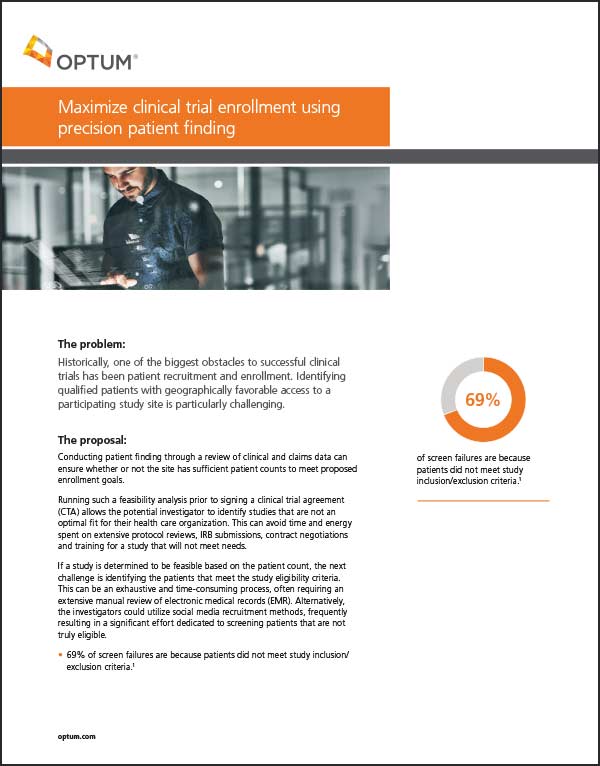Many life sciences companies already use real-world data (RWD) to inform key parts of the drug development process. However, we see expanding opportunities for manufacturers and clinicians to leverage RWD as a tool for reducing some of the most persistent patient recruitment challenges plaguing trials today. These include locating patients in community health settings and creating an external control arm to strengthen study findings when a traditional randomized control trial is infeasible.
Scott Morris, general manager of Clinical Trial Solutions at Optum Life Sciences, recently talked about the expanding use of RWD in clinical trials on a panel at the Precision Medicine World Conference 2023. He spoke about the Clinical Trials Access Network, a solution designed to improve access to appropriate clinical trials. Morris was joined on the panel by Liora Schultz, MD, from Stanford, Sanket Dhurva, MD, from the University of California, San Francisco, Motiur Rahman, PhD, from the U.S. Food and Drug Administration, and Farid Vij, from Invitae.
After the panel, I asked Morris about his main takeaways from the session and his thoughts on the future of clinical trials.
The community care-clinical trial disconnect
You mentioned during the discussion that about 85% of all clinical trial-eligible patients are seen in community care settings but never pre-screened for eligibility for advanced treatment options available in clinical trials. Why does this matter?
Expanding awareness of appropriate clinical trials isn’t just about the stage 4 cancer patient looking for a clinical trial as a last resort. At any given time, there are thousands of trials running that may benefit patients as a part of their larger treatment plans. If the patients aren’t being seen in or near an academic setting, or if there’s not a principal investigator looking for these patients in an everyday health care setting, their providers may not be aware that their patients even have clinical trials as options.
When we miss these patients in a community health setting, it presents a health equity issue in terms of access. There could be treatment options not only for patients with rare diseases or cancer but for those with chronic conditions as well. What we’ve been doing at Optum is leveraging health record information on behalf of the treating primary care and specialty providers to help identify potential clinical trial candidates in HIPAA-compliant ways. We recognize that there are gaps in the providers’ information, but in most cases the primary care physician (PCP) plays a role in discussing the clinical trial with the patient.
The importance of real-world data
There’s enough information in a patient record to at least do some electronic clinical prescreening. Then there are ways to integrate prescreening into clinical workflows so that the treating physician at a clinic or community care center is notified of potential trial-based treatment options for their patients. Hopefully, this may get some patients “off the bench” or into a cycle for further screening.
Perhaps the clinical trial could be at a nearby research center or retail location, or it could be a hybrid study in a home and virtual setting. The idea is to bring the trial medications and treatment options closer to patients while also giving providers the tools to easily connect with and onboard eligible patients.
What we’re doing is a combination of both concepts under our permitted uses with our health care providers by screening those patients and flagging them for the providers.
Making it easier to access clinical research as a care option
Where do you see the future of RWD use going in clinical trials?
Remember when it was much harder to get a referral to a specialist than it is for most patients today? We want to see that progress with getting patients into trials. We want that process to be more akin to getting a referral to a specialist.
There is a dearth of participants in clinical trials. It’s really activating the rest of the U.S. health care system to become more aware of which patients may qualify for certain trials. Here’s a case study of our work with Colonial Healthcare, a community primary care medical group with more than 30 providers and diagnostic services and specialists.
Novel methods to increase participation in clinical trials
We’ve been hearing a lot more buzz lately about external or synthetic control arms using RWD. How can this help in clinical trial processes?
I anticipate continued growth in the acceptance and adoption of RWD to support a wide range of clinical studies — from observational research to prospective studies and external control arms.
Here’s why external control arms are potentially important in rare disease. Imagine a researcher focused on developing treatments for a rare disease in the pediatric population. For a randomized control trial, they need a sufficiently large population to scan for patients who may enroll in the trial and enough patients to have the control arm. Trial recruiters were already looking for a needle in a haystack, and now, within a pediatric population, they’re looking for nano needles in that haystack.
They may turn to a single-arm trial, which limits the strength of the evidence without a comparison arm. However, they can increase confidence in a single-arm trial with an external control arm, which uses real-world data to model a control group to provide a frame of reference for trial results. There is also a need to decrease our dependence on a placebo arm when the goal is to get more patients on a potentially helpful medication.
I’m feeling hopeful that the work happening at Optum and across the health care system will help increase the usage of external control arms. And our solutions may help bring more diversity and access in clinical trials through community engagement, improved data and systems for outreach, along with modernized compliance processes that protect patient privacy.
Scott Morris
Vice President and General Manager, Clinical Trial Solutions, Optum Life Sciences
Related content

2023 trends shaping life sciences strategies

Maximize clinical trial enrollment



